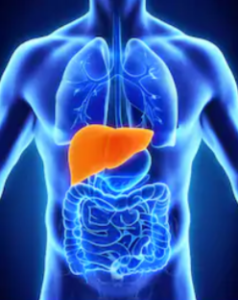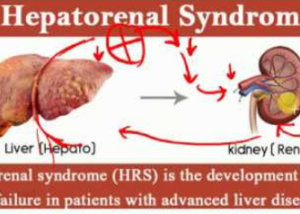
In acute liver failure (hypoxic or ischemic liver) that’s caused by chronic heart failure, the damage to the liver is not intrinsic to the organ but rather, the result of chronically poor blood flow.
An intrinsic problem might be a blood clot in the liver, toxicity from drugs, poison from mushrooms or a viral infection.
But a structurally normal liver can suffer injury over time from reduced blood flow due to a weakly pumping heart.
Poor blood flow to an organ is called hypoperfusion. In chronic heart failure it’s the kidneys that usually show signs of poor function (via the creatinine blood test).
Normally, cardiologists do not wonder how the liver is doing in chronic heart failure patients; they are more concerned about the kidneys because these much smaller organs are more likely to suffer insufficiency due to hypoperfusion.
But it happens every so often that in some chronic heart failure patients, their kidneys, though insufficient, are stable over years, but suddenly their liver crashes.
- There’s no history of alcohol, and tests for hepatitis viruses are negative.
- A CT scan shows no intrinsic issues such as cancer.
- The diagnosis is acute liver injury driven by poor cardiac output.
The aged weak liver has finally given up the good fight against years of hypoperfusion.
When this happens, is this acute liver failure—especially in a very elderly patient—always terminal?
After all, how do you fix hypoxic liver in this case? Double the heart’s ejection fraction with a safe pill? This medical technology is nowhere in sight.
“Acute liver failure is used to described a severe form of acute liver injury that is defined by the presence of certain clinical findings,” begins Daniel Motola, MD, a top board certified gastroenterologist and hepatologist providing same-day and next-day services in NYC with Gotham Medical Associates.
• Hepatic encephalopathy (cognitive impairment due to liver failure)
• Elevated INR > 1.5 (measure of blood clottability)
• Evidence of severe hepatic injury marked by highly elevated liver enzymes (aminotransferases).
• In some cases the liver enzymes may not be as high as expected, while the other two clinical findings are clearly in place.
Dr. Motola continues, “The term ‘acute liver failure’ is used to describe the above findings in someone without cirrhosis or known pre-existing liver disease (usually not known for <26 weeks).
“Acute liver failure is not universally fatal; close to half or more of patients will survive without the need for a liver transplantation, provided the underlying cause is treated.”
And therein lies the problem: underlying cause. If it’s chronic heart failure in an elderly person, the only way to remedy this is to give a pill that magically causes the heart to de-age and be as fit as it was many years ago.
Though cardiac function is considered “improved” when a diuretic drug removes fluid around the heart, this isn’t improvement per se, but rather, removal of something harmful to the heart (surrounding fluid).
Yet this procedure is sometimes deemed “improves cardiac function.” That’s like saying removal of a heavy backpack from the back of someone with severe spinal stenosis improves spinal function.
“If a person has acute liver failure from heart failure, which results in low perfusion state, the failure could be terminal if the heart failure is not treated,” says Dr. Motola.
Heart failure can result from factors other than an old heart getting weaker over time. It can be caused by a heart attack or a viral infection.
In the case of an elderly person whose heart has been declining with time, there is nothing that can rejuvenate this old weak heart with a very poor ejection fraction (amount of blood pumped with each beat).
So when hypoxic liver or acute liver injury eventually occurs (and it can show clinically over just a matter of days), this is terminal, end state organ failure, especially since acute liver injury will lead to acute kidney injury: end stage multi-organ failure.
If you are interested in a consultation with one of Gotham Medical Associates’ gastroenterologists please call 212-227-3688 or book online. Our staff will be happy to assist you, your family member or friend.
 In addition to his liver transplant expertise, Dr. Motola offers expertise in chronic liver disease, GERD, IBS, colon cancer screening, endoscopy and disorders of the bile ducts and gallbladder.
In addition to his liver transplant expertise, Dr. Motola offers expertise in chronic liver disease, GERD, IBS, colon cancer screening, endoscopy and disorders of the bile ducts and gallbladder.
 Lorra Garrick has been covering medical, fitness and cybersecurity topics for many years, having written thousands of articles for print magazines and websites, including as a ghostwriter. She’s also a former ACE-certified personal trainer.
Lorra Garrick has been covering medical, fitness and cybersecurity topics for many years, having written thousands of articles for print magazines and websites, including as a ghostwriter. She’s also a former ACE-certified personal trainer.
.


























